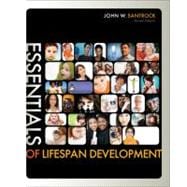Why are you assigning or considering a brief Human Development text? Is it because your students do not complete the reading in a comprehensive text? Do you run out of time trying to cover the entire lifespan over the course of a few months? Do your students struggle to retain the sheer volume of information in the course? Instructors from across the country have clamored for a streamlined text that captures the core concepts of life-span development.
Santrock Essentials 2e was developed to help meet the ever-changing needs of students in the lifespan course. Knowing that students do not often read the text and have poor study skills, Santrock Essentials introduces an adaptive diagnostic that helps students know what they know and what they don’t know to become more efficient and effective learners. Organized in a concise format, Santrock Essentials helps students relate to the material and study more efficiently by driving them to the applicable reading content in a format that is more student-friendly.
Based on hallmark features- its expert contributors, updated research and focus on applications, Santrock provides the most dependable and current presentation of lifespan development available, and he does so in a briefer format and with our adaptive diagnostic helping to ensure that your students will read and appreciate the material while seeing the applications to their everyday life. In Santrock, our new Milestones video and assessment program helps bring the course material to life, so your students can witness development as it unfolds.
This book uses simplistic language to explain various theories and studies about human development. The various theories presented focus on biological, physiological, and sociological development during early, middle, and late stages of life for infants, children, adolescents, and adults. Throughout the book the continuing debate between nature and nurture as having ultimate control over human development is presented.
Essentials of Lifespan Development 2e, was carefully designed and constructed to deliver these core concepts along with a strong applications focus reflecting the broad range of interests and backgrounds of students taking this course. And as always with John Santrock’s texts, the latest research in the field is incorporated throughout.
